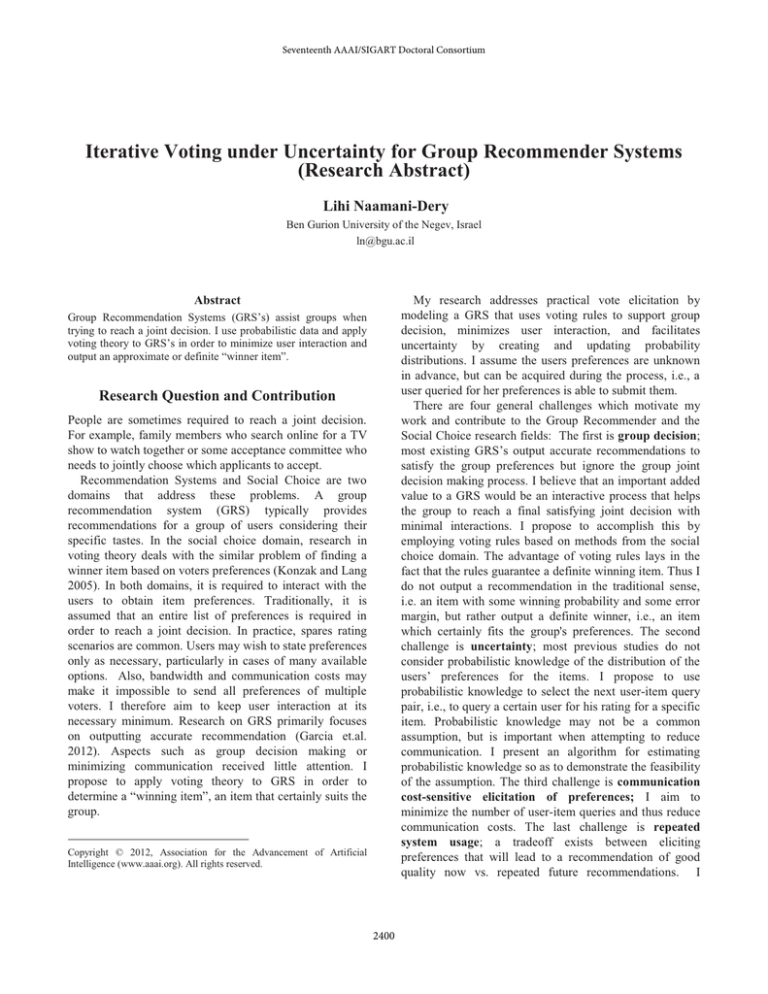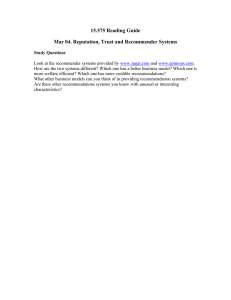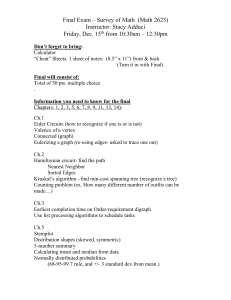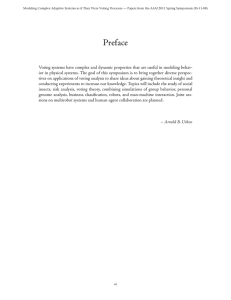
Seventeenth AAAI/SIGART Doctoral Consortium
Iterative Voting under Uncertainty for Group Recommender Systems
(Research Abstract)
Lihi Naamani-Dery
Ben Gurion University of the Negev, Israel
ln@bgu.ac.il
My research addresses practical vote elicitation by
modeling a GRS that uses voting rules to support group
decision, minimizes user interaction, and facilitates
uncertainty by creating and updating probability
distributions. I assume the users preferences are unknown
in advance, but can be acquired during the process, i.e., a
user queried for her preferences is able to submit them.
There are four general challenges which motivate my
work and contribute to the Group Recommender and the
Social Choice research fields: The first is group decision;
most existing GRS’s output accurate recommendations to
satisfy the group preferences but ignore the group joint
decision making process. I believe that an important added
value to a GRS would be an interactive process that helps
the group to reach a final satisfying joint decision with
minimal interactions. I propose to accomplish this by
employing voting rules based on methods from the social
choice domain. The advantage of voting rules lays in the
fact that the rules guarantee a definite winning item. Thus I
do not output a recommendation in the traditional sense,
i.e. an item with some winning probability and some error
margin, but rather output a definite winner, i.e., an item
which certainly fits the group's preferences. The second
challenge is uncertainty; most previous studies do not
consider probabilistic knowledge of the distribution of the
users’ preferences for the items. I propose to use
probabilistic knowledge to select the next user-item query
pair, i.e., to query a certain user for his rating for a specific
item. Probabilistic knowledge may not be a common
assumption, but is important when attempting to reduce
communication. I present an algorithm for estimating
probabilistic knowledge so as to demonstrate the feasibility
of the assumption. The third challenge is communication
cost-sensitive elicitation of preferences; I aim to
minimize the number of user-item queries and thus reduce
communication costs. The last challenge is repeated
system usage; a tradeoff exists between eliciting
preferences that will lead to a recommendation of good
quality now vs. repeated future recommendations. I
Abstract
Group Recommendation Systems (GRS’s) assist groups when
trying to reach a joint decision. I use probabilistic data and apply
voting theory to GRS’s in order to minimize user interaction and
output an approximate or definite “winner item”.
Research Question and Contribution
People are sometimes required to reach a joint decision.
For example, family members who search online for a TV
show to watch together or some acceptance committee who
needs to jointly choose which applicants to accept.
Recommendation Systems and Social Choice are two
domains that address these problems. A group
recommendation system (GRS) typically provides
recommendations for a group of users considering their
specific tastes. In the social choice domain, research in
voting theory deals with the similar problem of finding a
winner item based on voters preferences (Konzak and Lang
2005). In both domains, it is required to interact with the
users to obtain item preferences. Traditionally, it is
assumed that an entire list of preferences is required in
order to reach a joint decision. In practice, spares rating
scenarios are common. Users may wish to state preferences
only as necessary, particularly in cases of many available
options. Also, bandwidth and communication costs may
make it impossible to send all preferences of multiple
voters. I therefore aim to keep user interaction at its
necessary minimum. Research on GRS primarily focuses
on outputting accurate recommendation (Garcia et.al.
2012). Aspects such as group decision making or
minimizing communication received little attention. I
propose to apply voting theory to GRS in order to
determine a “winning item”, an item that certainly suits the
group.
Copyright © 2012, Association for the Advancement of Artificial
Intelligence (www.aaai.org). All rights reserved.
2400
propose to use active learning methods in order to develop
a model that is useful for future recommendations as well
as a standalone recommendation.
that a winning item will be found. On Netflix dataset the
communication cost can be cut by more than 50%.
Currently, I have developed an algorithm for dealing
with uncertainty. The algorithm computes a nonparametric
probability distribution for each user’s preferences of
items. It then updates the distribution as new information is
revealed. I have also extended my published work to the
Borda voting protocol. The advantage of Borda is that
users rank their preferences instead of rating items, which
is sometimes an easier task for the user.
My future work plan consists of two steps. Step 1
includes approximating a winning item; there is a tradeoff
between (1) finding the optimal winner and thus having an
accurate result and (2) the number of queries needed for
this process. I wish to study the correlation between user
interaction and the winner approximation accuracy. Step 2
includes the development of an active learning algorithm;
the goal of active learning is to effectively acquire the most
informative rated items from users (Jin and Si 2004). I
wish to extend this definition to GRS’s: both users and
items are actively selected, the goals being: (1) to improve
the recommender model for future recommendations and
(2) to further establish the current model hypothesis for a
better current recommendation.
Related Work
Predefined probability distribution of the votes is assumed
by Hazon et al. (2008). They evaluate the winning
probability of each item in different protocols and show
theoretical bounds for the ability to calculate the
probability of an outcome. Bachrach et al. (2010) compute
the probability of an item to win. Both papers focus on
calculating an item winning probability, while I focus on
practical vote elicitation, i.e., finding a winner using a
minimal amount of queries. To the best of my knowledge,
only Lu and Boutlier (2011) tackle vote elicitation using a
minimal amount of queries. However they do not assume
or use the probability vote distribution.
In the recommender domain, few papers have dealt with
uncertainty (McCarthy et al. (2006) and De Campos et.al
(2009)). None dealt with minimizing user interaction or
with updating the user distribution. Koren and Sill (2011)
propose a framework for finding probability distribution,
which is used for rating prediction but not for preference
elicitation. Their method is not updated when new ratings
are revealed.
References
Bachrach Y., Betzler N., Faliszewski P. 2010. Probabilistic
possible winner determination. In Proceedings of 24th AAAI.
de Campos, L., Fernández Luna, J., Huete, J., Rueda Morales, M.
2009. Managing uncertainty in group recommending processes.
User Modeling and User Adapted Interaction 19:3:207 242.
Garcia, I., Pajares, S., Sebastia, L., Onaindia, E. 2012. Preference
elicitation techniques for group recommender systems,
Information Sciences, 189:155 175
Hazon, N., Aumann, Y., Kraus, S., and Wooldridge, M. 2008.
Evaluation of election outcomes under uncertainty.
In
proceedings of 7th AAMAS, Richland, SC.
Jin, R. and Si, L. 2004. A Bayesian approach toward active
learning for collaborative filtering. In Proceedings of the 20th
UAI, AUAI Press, Arlington, Virginia, 278 285.
Konczak, K., and Lang, J. 2005. Voting procedures with
incomplete preferences. In Proceedings of 19th IJCAI Workshop
on Advances in Preference Handling.
Koren, Y. and Sill, J.. 2011. OrdRec: an ordinal model for
predicting personalized item rating distributions. In Proceedings
of the 5th Recsys. ACM, New York, NY, USA.
Lu T. and Boutilier C. 2011.Robust Approximation and
Incremental Elicitation in Voting Protocols. In Proceedings of
the 22nd IJCAI, Barcelona, Catalonia, Spain.
McCarthy, K., Salamó, M., Coyle, L., McGinty, L, Smyth, B.,
Nixon, P. 2006. Group recommender systems: a critiquing based
approach. In Proceedings of the 11th IUI. ACM New York, USA.
Naamani Dery, L., Kalech, M., Rokach, L., and Shapira, B. 2010.
Iterative voting under uncertainty for group recommender
systems. In Proceedings of the 4th. ACM, New York, NY, USA.
Research Plan
In (Naamani-Dery et.al 2010) I presented algorithms for
practical voting elicitation. I focused on Range voting,
where users assign items a rating within a specified range.
The ratings for each item are summed, the winner being
the item with the highest score. Range voting is relevant in
existing recommender systems applications where users
rate items within a specified range (e.g., Netflix).
Computing the optimal minimal set of queries that are
required to determine a winner is computationally
intractable, due to the combinatorial space of queries
orders. Thus I proposed two heuristic approaches to
address this challenge. Both approaches proceed
iteratively, querying a selected user-item pair. To
determine a user-item pair, the first algorithm heuristically
computes the information gain of each potential query
based on the entropy of the probability of the items to win.
The query that maximizes the information gain is selected.
The second algorithm uses the user’s probability
distribution to select the item most likely to win and the
user that is expected to maximize the score of that item.
Experiments on a simulated meeting schedule domain
and on real-world Netflix contest dataset show that the
algorithms saves much communication while guaranteeing
2401



